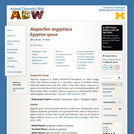
Alopochen aegyptiacus: Information
- Subject:
- Life Science
- Zoology
- Material Type:
- Reading
- Provider:
- University of Michigan Museum of Zoology
- Provider Set:
- Animal Diversity Web
- Author:
- Anna Tattan (author), University of Michigan
- Date Added:
- 03/07/2005

Alopochen aegyptiacus: Information
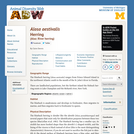
Alosa aestivalis: Information
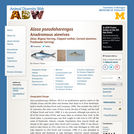
Alosa pseudoharengus: Information
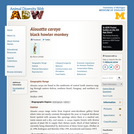
Alouatta caraya: Information
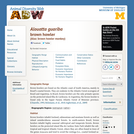
Alouatta fusca: Information
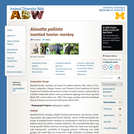
Alouatta palliata: Information
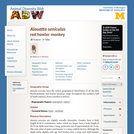
Alouatta seniculus: Information
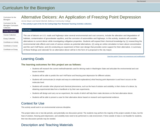
Road deicers raise several environmental and cost concerns. In this activity students consider alternatives while investigating colligative properties.
(Note: this resource was added to OER Commons as part of a batch upload of over 2,200 records. If you notice an issue with the quality of the metadata, please let us know by using the 'report' button and we will flag it for consideration.)
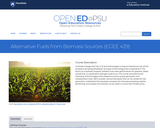
Is climate change real? Yes, it is! And technologies to reduce Greenhouse Gas (GHG) emissions are being developed. One type of technology that is imperative in the short run is biofuels; however, biofuels must meet specifications for gasoline, diesel, and jet fuel, or catastrophic damage could occur. This course will examine the chemistry of technologies of bio-based sources for power generation and transportation fuels. We'll consider various biomasses that can be utilized for fuel generation, understand the processes necessary for biomass processing, explore biorefining, and analyze how biofuels can be used in current fuel infrastructure.
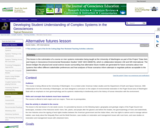
Alternative futures studies are a valuable yet resource-intensive way in which environmental scientists try to conduct informed debates about policies for specific geographic regions. These studies require modeling what the future would look like if different stakeholder groups had their way. The modeling is carried out by applying historical trend data to future projections that are rooted in the preferences of the different groups. Alternative future studies can be controversial due to the limitations of modeling and to the extent to which the models represent fully the different possible scenarios. Yet, they can be especially valuable for decision making about which areas in the region would be most appropriate and most acceptable for the applications of different policies such as development and restoration. Through a series of hands-on classroom activities that are the culmination of a variety of field trips, case studies, and analyses of GIS data about river systems and river restoration options, the students build deep understanding about what alternative futures studies entail and what are the applications of such studies to specific rivers in the Puget Sound area.
(Note: this resource was added to OER Commons as part of a batch upload of over 2,200 records. If you notice an issue with the quality of the metadata, please let us know by using the 'report' button and we will flag it for consideration.)
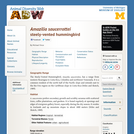
Amazilia saucerrottei: Information
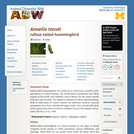
Amazilia tzacatl: Information

Students will learn how to perform basic skills using a Garmin GPS unit; mark waypoints, navigate to a waypoint, use the compass and 'go to' functions to estimate distance to a pre-programmed point, change GPS data to find hidden locations. Students will work in teams and help each other as they learn new GPS skills and gain a working understanding of georeferenced data, using clues and team work to solve problems, and how objects are oriented in space.
(Note: this resource was added to OER Commons as part of a batch upload of over 2,200 records. If you notice an issue with the quality of the metadata, please let us know by using the 'report' button and we will flag it for consideration.)
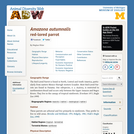
Amazona autumnalis: Information
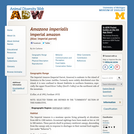
Amazona imperialis: Information
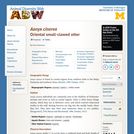
Amblonyx cinereus: Information
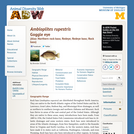
Ambloplites rupestris: Information
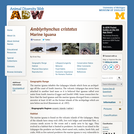
Amblyrhynchus cristatus: Information
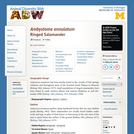
Ambystoma annulatum: Information
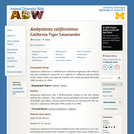
Ambystoma californiense: Information